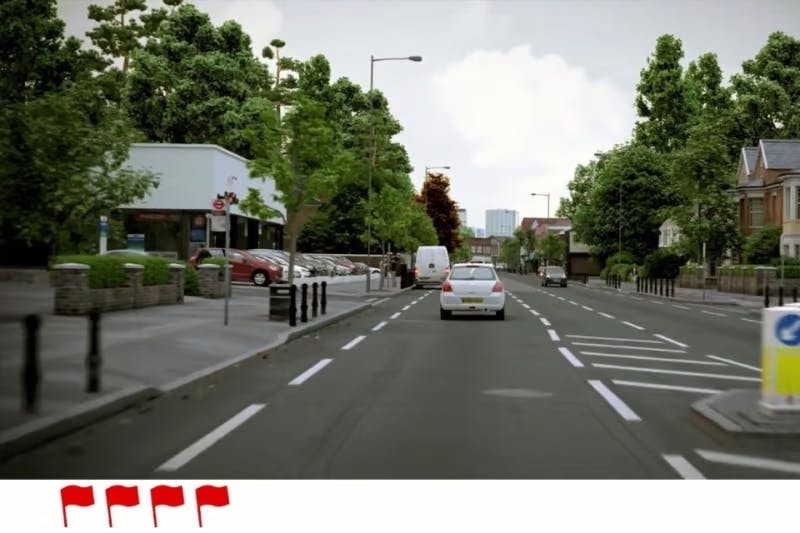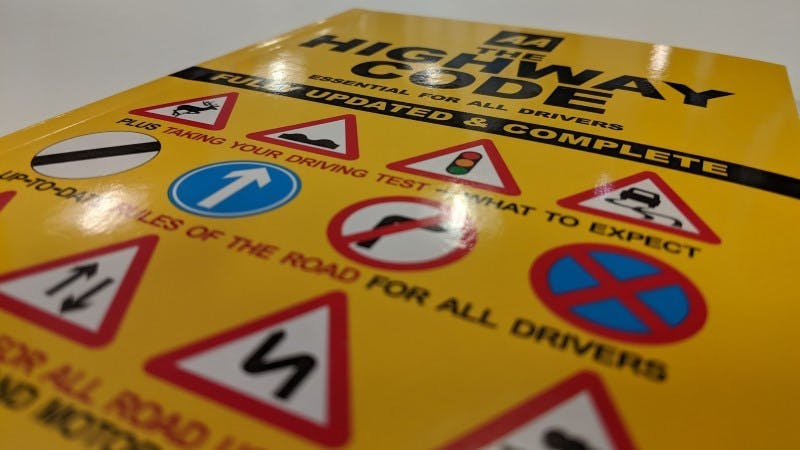
Before you can take the driving test and get your hands on a full driving licence, you first have to pass the theory test. Designed to test your knowledge of the road, Highway Code and much more, the theory test packs quite the punch. Of course, this clashes with the popular opinion amongst learners that the test simply requires common sense. You might be wondering then, is the theory test hard?
In order to answer this question, we’re going to have a look at pass rates from the last decade, discuss how the theory test format has changed and take a peek at some of the questions you can expect. Let’s go!
How hard is the theory test?
The theory test was created by the DVSA to test a learner driver’s understanding of the rules of the road, the Highway Code and road safety in general. It currently consists of a multiple-choice section and a hazard perception test. (You can find out more about the format of the test in the next section.) Now, given how subjective the difficulty of tests can be from person to person, we decided that the only way we could determine whether the theory test is hard or not was to look at pass rates.
With that in mind, we looked towards the DVSA’s latest statistics for answers. We sifted through the statistics available and compiled pass rates from the last decade in order to get a better understanding of how hard the theory test is to pass (and how this might have changed with time).
Pass rates have been in steady decline since 2008/09—with pass rates starting at 65.4% in 2007/08 and ending up all the way down at 47.1% by 2019/20! It’s certainly enough to suggest that the theory test is getting harder. So, why exactly is this the case?
Ultimately, it all boils down to two main factors: how much the theory test format has changed over the years and how learners choose to prepare for the theory test. Let’s explore this further...
Changes to the theory test format

The theory test has been around since 1996, so it’s not entirely surprising to find that its format has had to change over the years. The entire point of the theory test is to ensure that learners are up-to-date with the latest rules of the road—which means that it will inevitably have to be updated. In an attempt to keep the test relevant, the DVSA have had to introduce new elements over the years...
- 1996: the theory test was first introduced. It consisted of 35 multiple-choice questions. Learners had to score 30 out of 35 to pass. (The test switched to a computer format in 2000.)
- 2002: the DVSA introduced the hazard perception section. It consisted of video clips which included at least one developing hazard.
- 2007: the multiple-choice section was increased from 35 questions to 50. Consequently, learners had to score 43 out of 50 to pass (in addition to scoring 44 out of 75 to pass the hazard perception section).
- 2009: the DVSA introduced case studies at the end of the multiple-choice section to see how learners could apply their knowledge to real-life scenarios. Further case studies were added in 2011.
- 2013: the DVSA refreshed their question bank in order to stop questions from the actual test showing up in practice papers.
As you can see, the theory test has come a long way since 1996. (And it will surely continue to do so in the future!) As the years have passed, the DVSA have come to expect more and more from learners when it comes to their theoretical knowledge. It’s not enough for learners to guess their way through questions. They need to fully understand this knowledge in order to apply it in real-life scenarios and become safe drivers on the road.
Have these changes made the theory test harder to pass?
It could certainly be said that the changes to the theory test format over the years have made it harder to pass. In fact, MoneySuperMarket compiled a study recently which involved 2,800 drivers being asked sample questions from the theory test. Only 11% of them were able to answer every question correctly! Bear in mind that these participants were all fully qualified drivers—people you’d assume would need this knowledge in their day-to-day lives.
Of course, it could be argued that certain aspects of the theory test are a bit too niche for the everyday driver, which could explain why drivers struggle so much. The AA, for example, argued that some of the questions are “quite obscure”, e.g., knowing what to do if a road user suffers a burn during a car accident.
As with any other test you might take in your lifetime, however, the challenge the theory test poses can be overcome with preparation. This brings us to our next point...
Learners underestimating the theory test

Let’s face it, whether you’re a learner or qualified driver, you’ll have undoubtedly been told by friends and family that the theory test is a walk in the park. Unfortunately, this is just one of the many theory test myths perpetuated by the learner driver community. It is not common sense. You can’t expect to pass it without doing any revision.
When it comes to revising for the theory test, start with the Highway Code, which provides vital road information and rules. We advise buying resources like the official DVSA handbook or the AA theory test book. They both contain official DVSA questions with answers. Revise them thoroughly—they could show up on your test.
Don’t believe us? Let’s take a look at the sample of questions used by MoneySuperMarket:
1. You wish to tow a trailer. Where would you find the maximum nose weight allowed on your vehicle’s tow hitch?
A. The vehicle handbook
B. In the Highway Code
C. Your vehicle registration certification
D. In your licence documents
2. When are anti-lock brakes (ABS) most effective?
A. When you keep pumping the foot brake to prevent skidding
B. When you brake normally but grip the steering wheel tightly
C. When you brake firmly and promptly until you’ve stopped
D. When you apply the handbrake to reduce the stopping distance
3. What does the law require you to keep in good condition?
A. Gears
B. Transmission
C. Door locks
D. Seat belts
4. You’re driving on the road in dry weather. What should the distance be between you and the vehicle in front?
A. A two-second time gap
B. One car length
C. Two metres
D. Two car lengths
5. What colour are the reflective studs between a motorway and its slip road?
A. Amber
B. White
C. Green
D. Red
Though you might be able to answer a few questions correctly just by pure chance, you can’t get away with passing the theory test simply by blagging your way through it. It requires you to carefully read through the Highway Code, familiarise yourself with road signs and get to grips with various other need-to-know topics.
It doesn’t matter if you don’t agree with how specific some of the questions can be, or if you feel like you’ll never need to apply any of the knowledge in your day-to-day driving. If you want to drive, you need to buckle down and put in the work.
Is the theory test hard? Yes—but it’s not impossible!
We’d be lying if we told you that the theory test is a piece of cake. It isn’t—the decline in pass rates reflects this. It will require you to memorise a great deal of theoretical knowledge and put in a lot of hard work to pass. That being said, hypothetically, it should mean that all learners will be prepared for any challenge that might come their way on the road.
By making the theory test hard to pass, and having expiry dates on theory test pass certificates, the DVSA has ensured that all learner drivers have the skills and knowledge necessary to get behind the wheel of a car. Of course, the it won’t be half as challenging if you actually prepare for it. So, avoid cutting corners and start revising!
To help you out, we’ve compiled our top revision resources just for you!
- Ultimate theory test revision resources: you can find mock tests, practice questions, hazard perception clips, revision apps and much more in our handy revision resources guide.
- Prepare for success—how to pass your theory test: find out exactly what happens in the theory test, what to expect on the day and some top tips from PassMeFast so you can fly through your test!
- Hazard perception dos and don’ts: the hazard perception section always trips up learners, so it’s important that you familiarise yourself with it and know exactly what you need to do.
- Last minute theory test tips: worried about an upcoming theory test? Read up on our compilation of handy last minute theory test tips!
Subscribe for driving advice, offers & more
We'd love to let you know about our courses, news and offers via email. You may unsubscribe at any time.
Star Genie Limited trading as PassMeFast. Company number 10093359
Copyright © 2024 owned by Star Genie Limited
PassMeFast, Blue Tower, MediaCityUK, Salford, M50 2ST

